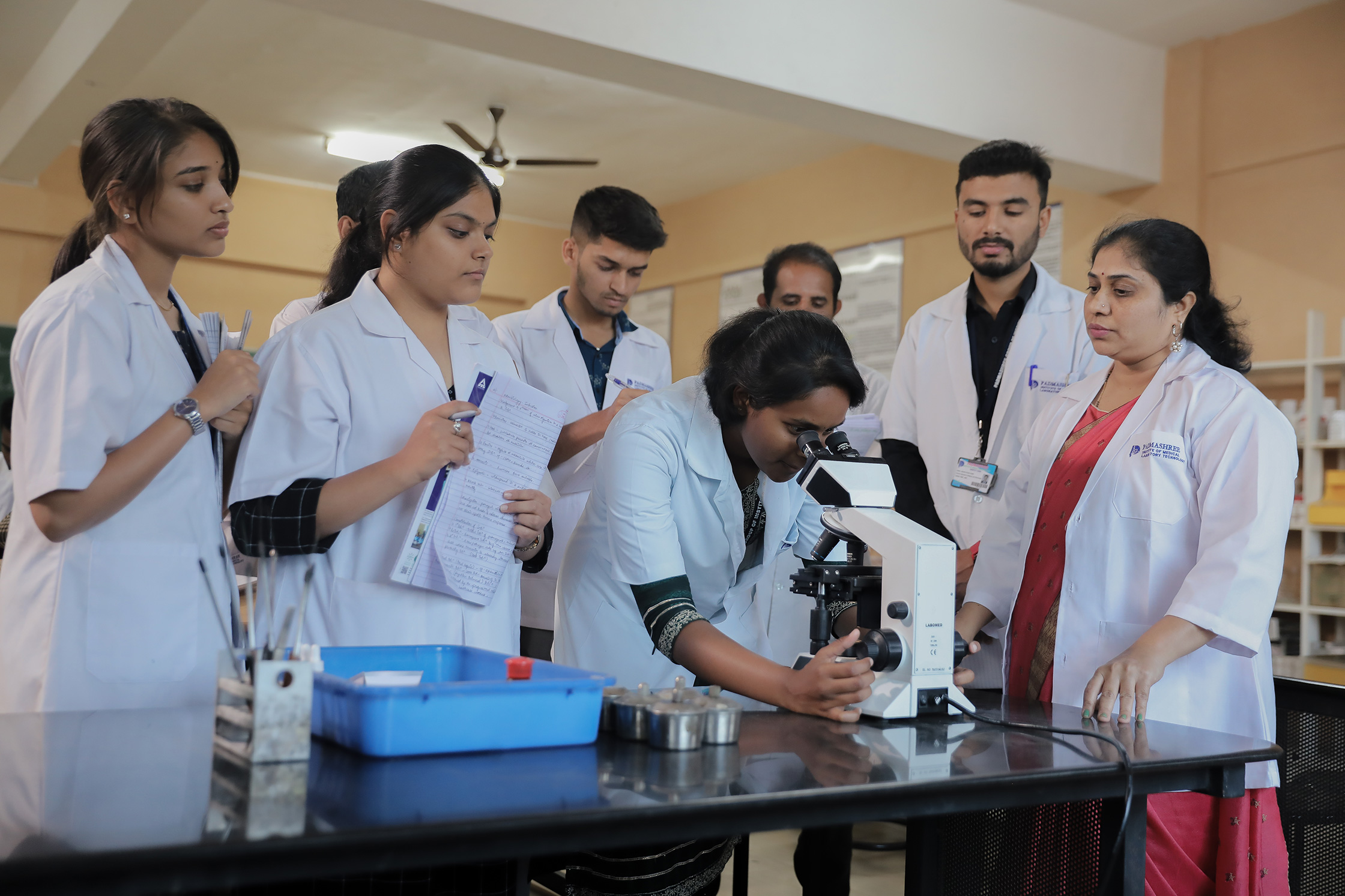M.Sc Medical Laboratory Technology in Microbiology and Immunology
- Home
- M.Sc Medical Laboratory Technology in Microbiology and Immunology

About the Course:
Microbiology is a dynamic field which has grown rapidly both with regard to fundamental knowledge and its application to medicine, agriculture, and industry. Dozens of biotechnology companies, formed to exploit these advances, provide employment for students with suitable training at masters’ level. The course studies the diversity of microbial types, how microorganisms can be used and manipulated to aid mankind and the detrimental effects (for example on health) of microorganisms. New industries devoted to genetic engineering offer microbiologists excellent career opportunities. Microbiologists are also in great demand in clinical microbiology. Microbiology graduates are well equipped for a wide variety of careers. They usually secure jobs in their respective fields of interest, most in the world of science.
The course studies the diversity of microbial types, how microorganisms can be used and manipulated to aid mankind and the detrimental effects (for example on health) of microorganisms. The industrial visits and internships are arranged to allow the students to gain insight into the application of the subject in the industry. The curriculum has been designed to train the students in good lab practices and encourage them to expand their knowledge base by applying for projects and publishing papers.
Intensive lab works and project works are carried out to equip the students in microbiological techniques.
Affiliated to Rajiv Gandhi University of Health Sciences
2 Years (4 Semesters)
- A pass in B.Sc MLT course from institutions affiliated to RGUHS, or from other Universities considered equivalent by RGUHS.
- A candidate who has completed B.Sc. in Clinical Biochemistry/Medical Biochemistry or B.Sc in Clinical Microbiology/Medical Microbiology are eligible to join for M.Sc MLT in Clinical Biochemistry or M.Sc MLT in Microbiology and Immunology respectively.
- Candidates passing B.Sc MLT through correspondence course shall not be eligible.
- No candidate shall be admitted for the postgraduate degree course unless the candidate has obtained and produced the eligibility certificate issued by the university. The candidate has to make the application to the university with the following documents along with the prescribed fee.
- Pass / degree certificate issued by the university.
- Marks cards of all the university examinations passed.
- Migration certificate.
- Certificate of conduct.
- Proof of SC/ST or category- I as the case may be.
- Candidates should obtain the eligibility certificate before the last date for admission as notified by the university.
Biochemistry-I
- Over View
- Carbohydrates
- Amino Acids and Proteins
- Non-Protein Nitrogenous Compounds
- Plasma Proteins
- Diagnostic Enzymology
- Lipoprotein
- Specimen Collection
- Cerebrospinal Fluid
- Analytical Considerations
- Water Electrolyte Balance
- Acid-Base Balance
- Energy Metabolism and Nutrition
- Radio Active and Nutrition
Microbiology-I
Section-A:
Clinical/Generalmicrology
- General Aspects
- Infection and Infectious Agents
- Diagnostic Procedures
- Biomedical Waste and Disposal
- Antimicrobial Agents
Section-B:
- Immunology
- Molecular Biology
Haematology and Blood Transfusion-I
Section-A:
Haematology and Clinical Pathology
- Haematopoiesis
- Disorders of Erythrocytes
- Disorders of Haemoglobin
- Harmolytic Anaemias
- Hdn
- Aplastic Anaemia
- Bone marrow Examination
- Leucocyte Disorders
- Myeloproliferative Disorders
- Lymphoproliferative Disorders
- Platelets
- Haemoparasites
- Automation in Haematology-Demonstration
- Cleaning of Glassware
- Biomedical Waste Management
- Ordering of Reagents, Storage and Maintenance Of equipments
- Organization and Quality Control in Haematology Laboratory
Clinical Pathology
Section B:
Immunopathology and Medical Genetics
Microbiology-II
Paper-I
- Systemic Bacteriology
- Applied Microbiology
- Immunology
Paper-II
- Virology
- Mycology
- Parasitology
- Biostatistics
- Research Methodology
- There is vast scope in the field of microbiology due to the advancement in the field of science and technology.
- The scope in this field is immense due to the involvement of microbiology in many fields like medicine, pharmacy, diary, industry, clinical research, water industry, agriculture, chemical technology and nanotechnology.
- The study of microbiology contributes greatly to the understanding of life through enhancements and intervention of microorganisms.
- There is an increase in demand for microbiologists in India and globally.
- A microbiologist can innovate new diagnostic kits, discover new drugs, teach, research, etc.
- Microbiologists can work in the area of food, pharmacy, agrochemistry biotechnology, biorefinery, environment, pollution control and bioremediation.
- In the field of agriculture, microbiologists act as environmental and health specialists to study the role of microbes in plant disease, pest control, nutrition and soil fertility.
- In the field of medicine and health care, the work is usually associated with diagnosis, prevention and treatment of illnesses associated with microbes. Universities and colleges employ microbiologists as researchers and teachers.

